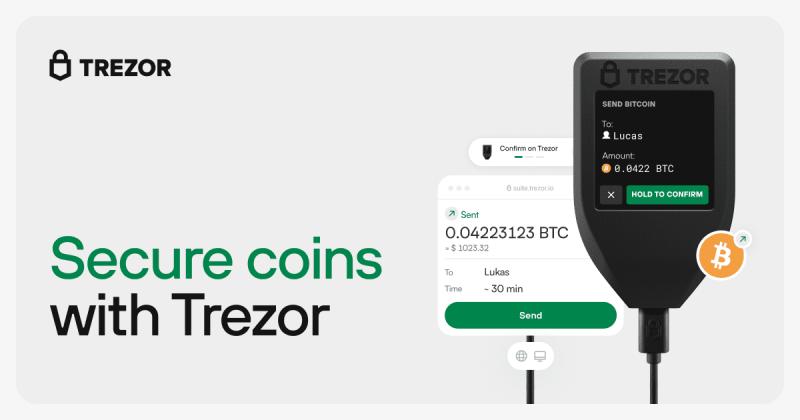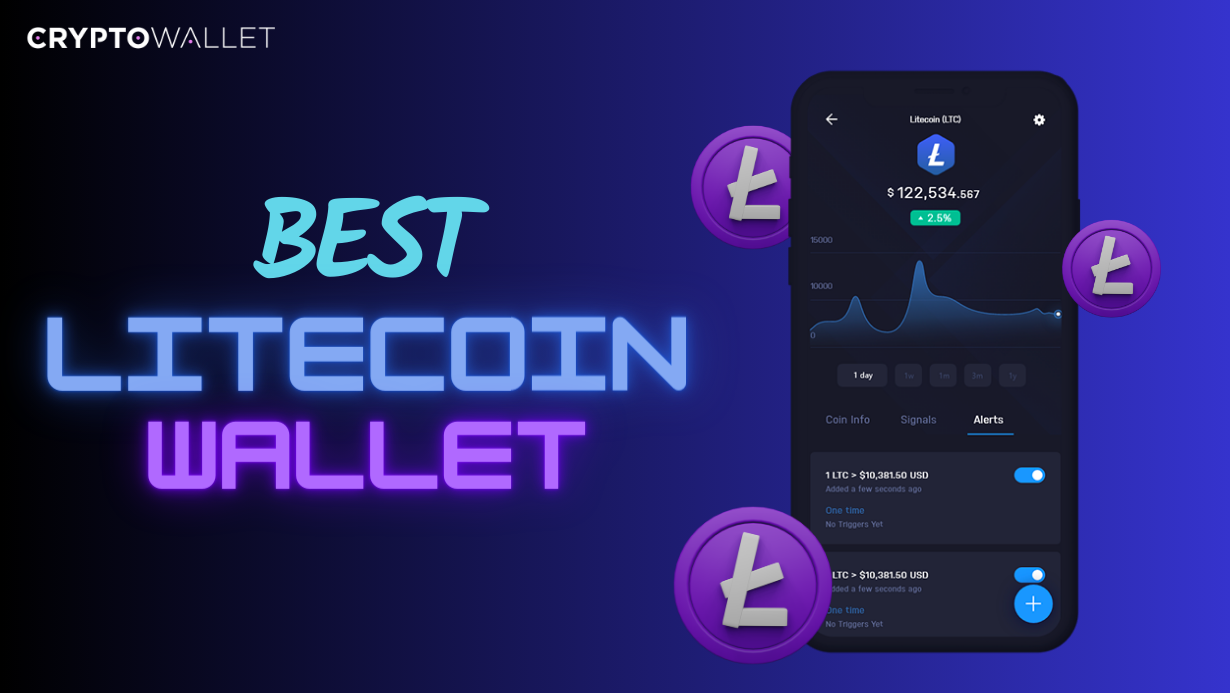
Best Litecoin (LTC) Wallet of 2024
Welcome to our guide on the best Litecoin wallets of 2024! In the fast-paced world of cryptocurrencies, few digital assets have proven their mettle and resilience as effectively as Litecoin (LTC). As one of the earliest altcoins, Litecoin has not only endured but thrived, and still maintains one of the most trusted crypto of 2024.
- CryptoWallet.com – Best wallet to spend Litecoin
CryptoWallet.com is the best Litecoin wallet for daily use. You can send and receive LTC with ease and manage 800+ other cryptos on multiple blockchain networks. You can also buy and sell Litecoin instantly and spend LTC with CryptoWallet.com Card.
- Trezor Model T – Best Hardware wallet for LTC
- Trust Wallet – Best LTC wallet for Mobile
Litecoin (LTC) is well-supported by a range of crypto wallets, providing users with various options to cater to their specific needs. Whether you prefer the convenience of a “hot wallet” accessible on your computer or mobile device or opt for the enhanced security of a “cold wallet” or “hardware wallet”, the choices are abundant.
In this blog, we’ve curated a comprehensive list of the best LTC wallets to help you discern which one stands out as the best Litecoin wallet for your specific needs. We’ll explore seven exceptional options, each embodying the qualities of user-friendliness, enhanced security, additional features, and compatibility with a variety of digital assets.

What is Litecoin Wallet?
A Litecoin wallet is a digital tool or software application that allows you to store, manage, send, and receive Litecoin (LTC), which is a popular cryptocurrency. Just like a physical wallet holds your cash and cards, a Litecoin wallet holds your digital currency.
Litecoin wallets have both a public address and a private key. The public address is what you share with others when you want to receive LTC, while the private key is kept secret and is used to access and manage your funds. It’s essential to keep your private key secure, as anyone who has access to it can control your Litecoin holdings.
Types of LTC Wallets
There are several types of Litecoin wallets, including:
Software Litecoin Wallets (Hot wallets)
Desktop Wallets: These are applications you can install on your computer. They offer a good balance between security and convenience. Examples include Litecoin Core and Electrum-LTC.
Mobile Wallets: These are apps designed for smartphones and tablets, making it easy to manage your LTC on the go. Examples include LoafWallet and Coinomi.
Web Wallets: These wallets are accessible through a web browser and are usually hosted by a third-party service. They are convenient but can be less secure. Examples include Coinbase and Exodus.
Read More: Best Crypto Wallets
Hardware Litecoin Wallets (Cold Wallets)
Hardware Litecoin wallets, often referred to as cold wallets, are physical devices designed to securely store your Litecoin (LTC) offline. They provide a high level of security because they are not connected to the internet, making it extremely difficult for hackers to access your cryptocurrency. Here are some popular hardware Litecoin wallets Ledger Nano X and Trezor Model T
When choosing the best Litecoin wallet, it’s crucial to consider factors such as security, ease of use, backup options, and the specific features offered by the wallet. Different wallets cater to different user preferences and needs, so it’s important to select the one that aligns with your requirements and risk tolerance. Now let’s explore some of the best Litecoin wallets.
Read more: Best Hardware Wallets
Top Litecoin Wallets
CryptoWallet.com
CryptoWallet.com is more than just a “crypto wallet”, it’s a crypto neobank that allows you to store more than 800 cryptos including Litecoins. It is the best wallet to spend Litecoin directly from your LTC wallet with CryptoWallet.com card

CryptoWallet.com also offers a simplified crypto exchange that lets you buy and sell hundreds of cryptos including Litecoin, Bitcoin, Ripple, Ethereum, and Tether, and all of these high-cap currencies are stored in connected wallets in the platform.
The wallet also supports fiat currency (EUR) that you can hold and manage using an IBAN. You can buy and sell cryptos using a credit or debit card.
- Type of wallet: Web and Mobile
- Purchase cost: Free
- Buy/Sell Cryptos: Yes
- Ease of Use: Very easy
Pros 👍
CryptoWallet.com is an all-in-one solution that allows you to store, trade, and even spend Litecoin. You can order a crypto card to connect your LTC funds and spend them in stores or online, as well as pay bills in digital currency or make bank transfers using a custom IBAN.
Cons 👎
The CryptoWallet.com exchange wallet is custodial, meaning users don’t have sole control of the “keys” or passwords related to their wallet. Some users prefer to have wallets that have no access to user keys.
However, non-custodial wallets don’t offer Crypto Cards, 24/7 customer support, IBAN, or crypto exchange that support fiat payments.
Trezor Model T
The Trezor Model T supports a wide range of cryptocurrencies, including Litecoin. You can use the same device to store multiple digital assets, making it a versatile choice for diversified cryptocurrency portfolios.
The Trezor Model T is one of the best LTC wallets, which is designed to keep your private keys secure offline. It features a secure element and offers protection against physical attacks. Your private keys never leave the device, providing an extra layer of security.
It comes with an intuitive and easy-to-use interface, making it accessible to both beginners and experienced users. The Trezor Model T has a touchscreen display, which adds to its user-friendliness and ease of use.
When using the Trezor Model T for Litecoin, you can set up a Litecoin wallet on the device and manage your LTC holdings through the Trezor Wallet interface. You can send and receive Litecoin securely, with the device confirming and signing transactions.
Read the full Trezor hardware wallet review.
- Type of wallet: Desktop and Web
- Purchase cost: €219
- Buy/Sell Cryptos: No
- Ease of Use: Intermediate
Pros 👍
The Trezor wallet offers an added level of security and protection by storing crypto assets offline in “cold storage,” one of the main features of hardware wallets compared to “hot wallets” or online crypto wallets. Thousands of cryptocurrencies are supported.
Overall, the Trezor Model T is a well-regarded hardware wallet that is suitable for storing Litecoin and various other cryptocurrencies. Its reputation for security and its user-friendly design make it a strong option for those looking to safeguard their digital assets.
Cons 👎
These wallets are not suitable for quick or easy trading on exchanges, as it may take time to access and transfer funds. You can’t spend funds on real-world goods or services with hardware wallets.
If you lose or damage the device, you’ll need the seed phrase key stored safely.
Ledger Nano X
The Ledger Nano X is a popular and highly secure hardware wallet designed for storing and managing a wide range of cryptocurrencies, including Litecoin (LTC) as well as Bitcoin, Ethereum, and many more.
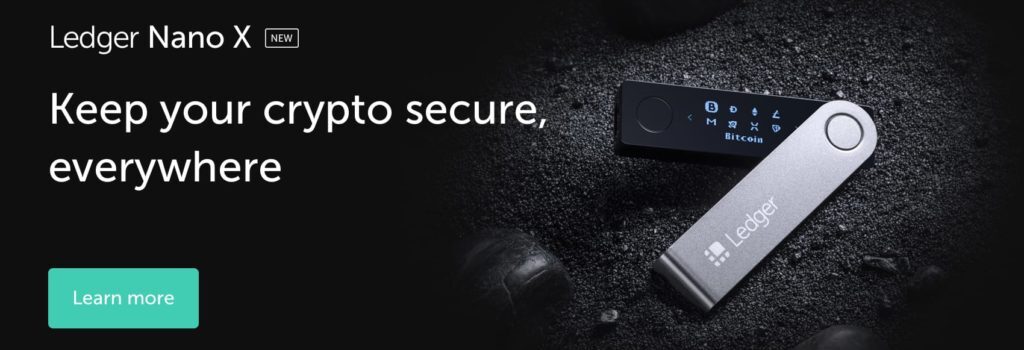
The Ledger Nano X features Bluetooth connectivity, allowing you to use it with your mobile device, and making it convenient for on-the-go management of your crypto assets.
The Ledger Nano X is known for its robust security features. It stores your private keys in a secure hardware element, ensuring they never leave the device, making it highly resistant to online threats.
- Type of wallet: Hardware (compatible with mobile)
- Purchase cost: £109
- Own exchange incorporated: No
- Ease of Use: Easy
Pros 👍
As with all hardware Litecoin wallets, the Ledger Nano X has a firm focus on security. You can interface these kinds of wallets with your computer, once you’ve set up the necessary software, and from there start sending and receiving funds.
Ledger uses offline storage, these wallets are very difficult to hack remotely. In order to send Litecoin, you need to use your Ledger Nano X to confirm and sign the transaction. This ensures that your private keys never leave the hardware wallet, enhancing security.
It is also compatible with mobile devices unlike its competitor Trezor. It comes with a user-friendly interface that makes it easy for both beginners and experienced users to navigate and perform transactions.
Cons 👎
Hardware wallets mostly come for a price, unlike many other top Litecoin wallets. The interface and setup process is a little bit more difficult to use than most options, and not suitable for fast trading.
If you’re trying to capitalize on a sudden change in the market, you may find that hardware wallets are quite slow, as it takes time to plug the device in, access the funds, and initiate a transfer.
Litecoin Core
Litecoin offers an official wallet called “Litecoin Core”, which is the official full-node LTC wallet, developed and maintained by the Litecoin community. It’s a desktop wallet, which means you need to download and install the software on your computer.

This is a full-node Litecoin wallet, which means it downloads and maintains a complete copy of the Litecoin blockchain. This enhances security and contributes to the network’s decentralization.
- Type of wallet: Desktop
- Purchase cost: Free
- Buy/Sell Cryptos: No
- Ease of Use: Intermediate
Pros 👍
This Litecoin wallet provides you with the ability to verify and sign transactions locally, adding an extra layer of security. It also supports multi-signature wallets for enhanced security, where multiple private keys are required to authorize transactions.
Cons 👎
Keep in mind that because Litecoin Core is a full-node wallet, it requires you to download the entire Litecoin blockchain, which can be quite large and may take some time to synchronize.
This wallet is best suited for users who are interested in supporting the Litecoin network’s decentralization and are willing to invest the time and resources in maintaining a full node.
Trust Wallet
Trust Wallet is one of the best Litecoin wallet for mobile that supports various cryptocurrencies, including Litecoin (LTC). As the official wallet affiliated with the Binance exchange, it excels as a ‘hot’ wallet, ideal for safeguarding large amounts of Litecoin and other assets. It’s available for both Android and iOS devices and is known for its simplicity and security.
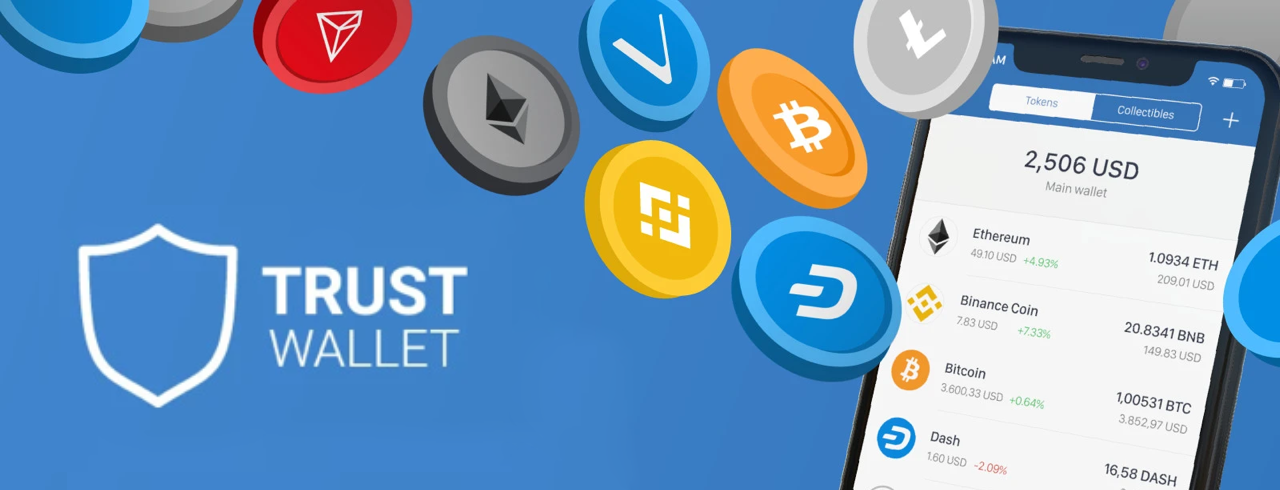
In addition to its Litecoin (LTC) support, Trust Wallet extends its compatibility to store and manage more than 4.5 million digital assets across over 65 blockchain networks, making it versatile for users with diverse digital asset portfolios.
Trust Wallet includes a built-in DApp (decentralized application) browser, enabling you to interact with decentralized applications and services directly from the wallet.
- Type of wallet: Mobile
- Purchase cost: Free
- Buy/Sell Cryptos: Yes (via partners)
- Ease of Use: Easy
Pros 👍
Trust Wallet is a convenient option for managing Litecoin and various other cryptocurrencies on the go. It provides users with full control over their digital assets and offers a user-friendly experience. Just remember to keep your recovery seed phrase safe and never share it with anyone, as it’s the key to accessing your funds.
Cons 👎
Mobile devices can be vulnerable to various security risks, including malware and phishing attacks. If your smartphone or tablet is compromised, it could potentially lead to the theft of your cryptocurrency holdings.
If your mobile device is lost or stolen, your Trust Wallet and its associated funds may be at risk. It’s essential to have your recovery seed phrase stored securely, so you can recover your wallet on a new device. However, losing the device could still pose a temporary security risk.
Exodus
Exodus is a popular multi-currency cryptocurrency wallet that allows you to store, manage, and exchange Litecoin (LTC). Exodus also supports a wide range of cryptocurrencies, making it a versatile wallet for users with diverse digital asset portfolios.
The wallet includes a built-in cryptocurrency exchange, allowing you to swap one cryptocurrency for another without leaving the wallet. This feature can be convenient for those looking to convert Litecoin to another cryptocurrency.

Exodus offers both mobile and desktop that can also be paired together making it easier to manage your Litecoin from anywhere.
This LTC wallet empowers users with complete control over their private keys. It also provides a portfolio overview that displays the value of your cryptocurrency holdings in real time, making it easy to monitor your assets.
- Type of wallet: Mobile, Desktop, Web
- Purchase cost: Free
- Buy/Sell Cryptos: Yes
- Ease of Use: Easy
Pros 👍
Exodus offers integration with the Trezor hardware wallet, enhancing security and allowing users to combine the convenience of a software wallet with the enhanced protection of a hardware wallet.
It also offers an extensive knowledge base with educational materials, FAQs, and blockchain-related resources. This is particularly beneficial for users seeking to expand their understanding of cryptocurrencies and blockchain technology.
Cons 👎
Exodus lacks phone or chat support, which may be a drawback for users who prefer immediate customer assistance.
Unlike some other Litecoin wallets, Exodus is not open-source, which means that its code cannot be independently reviewed by the cryptocurrency community. This could raise concerns for users who prioritize transparency and security verification.
Guarda
Guarda is a non-custodial Litecoin wallet that supports LTC and a variety of other digital assets. Guarda is available as a web wallet, desktop application (Windows, macOS, and Linux), and mobile app (Android and iOS), providing users with flexibility and accessibility across various devices.
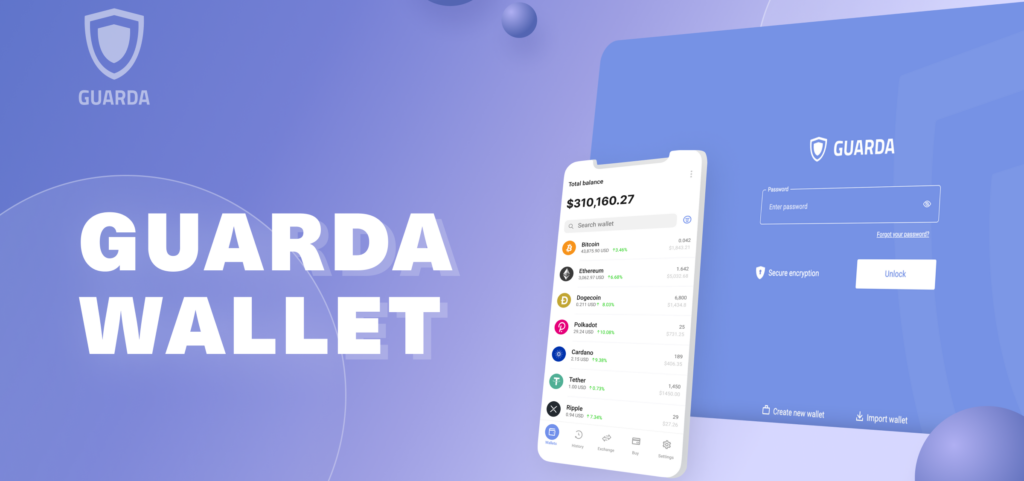
The wallet offers a built-in token swap service, enabling users to exchange one cryptocurrency for another without leaving the wallet. This can be convenient for trading and portfolio management.
Users can store, swap, earn interest, and buy Litecoin and other cryptocurrencies directly within the wallet. Guarda offers in-app staking, allowing users to earn interest on their digital assets. Many supported cryptocurrencies feature opt-in staking opportunities.
- Type of wallet: Mobile, Web, Desktop
- Purchase cost: Free
- Buy/Sell Cryptos: Swap only
- Ease of Use: Easy
Pros 👍
Guarda allows users to store funds on desktop, mobile, and web browsers. The wide variety of options will appeal to some traders. While Guarda is non-custodial, it still offers customer support in the event of an issue or lost funds. You can create multiple-user wallets for different currencies.
It is one of the best Litecoin wallets and features an intuitive and user-friendly interface, making it suitable for both newcomers and experienced cryptocurrency users.
Cons 👎
Guarda Wallet charges transaction fees for in-app crypto purchases, with a standard transaction fee rate of 5.5%. This fee structure may be considered relatively pricey when compared to competitors. However, it does offer customizable transaction fees for users.
This solution is still a basic storage-only app, with no added features such as a debit card, bank account number, or affiliate program.
Atomic Wallet
Atomic Wallet is a decentralized, non-custodial crypto wallet available in both mobile and desktop versions. It is known for its user-friendly interface that allows users to securely and privately manage their digital assets.

Atomic Wallet offers support for Litecoin as well as a wide range of cryptos, making it a versatile solution for managing diverse digital assets. Users can perform cryptocurrency exchanges within the wallet interface without needing to leave the application. This feature is available in both the mobile and desktop versions.
- Type of wallet: Mobile and Desktop
- Purchase cost: Free
- Buy/Sell Cryptos: Yes
- Ease of Use: Easy
Pros 👍
Users can store hundreds of different digital assets on Atomic Wallet, and also carry out atomic swaps for select currencies (a form of crypto trading). The app is supported on mobile devices.
Users can earn rewards through in-app staking, making it a convenient option for those interested in participating in cryptocurrency staking.
Cons 👍
Atomic Wallet may not be compatible with a wide range of hardware wallets, potentially limiting options for enhanced security.
Users can’t spend cryptocurrency on real-life goods or services using Atomic, so it’s still necessary to use the app in conjunction with a bank or something similar for that purpose. Like most non-custodial wallets, there’s no customer support, nor are there security features such as 2FA.

What is the Best LTC Wallet?
Selecting the best Litecoin (LTC) wallet depends on your specific needs and preferences. Here are some recommendations based on different use cases:
Best Wallet for Spending Litecoin: If you intend to spend Litecoin easily and use it for everyday transactions, CryptoWallet.com, with its crypto card, can be a convenient choice. The CryptoWallet.com card allows you to spend Litecoin and many other cryptocurrencies just like a regular debit card. It’s suitable for quick access to your digital assets.
Best Wallet to Store Large Amounts of LTC: For long-term storage of significant amounts of Litecoin, it’s highly recommended to use hardware wallets, also known as “cold wallets.” These wallets store your assets offline, protecting against hacks and online threats. The Trezor Model T and Ledger Nano X are two well-regarded options for securely storing your Litecoin and other cryptocurrencies.
Mobile Wallet for Regular Use: If you prefer a mobile wallet for your everyday needs and value the convenience of managing a wide range of crypto assets, Exodus or Trust Wallet is an excellent choice. It offers a user-friendly interface and supports various cryptocurrencies, making it versatile for mobile users.
Remember selecting the best Litecoin wallet depends on your specific requirements, such as security, ease of use, and the type of transactions you intend to perform. It’s advisable to use a combination of wallets to meet different needs. For example, you can have a hardware wallet for long-term storage and a mobile wallet for day-to-day transactions. Always prioritize the security of your assets and choose reputable wallet providers.
Hardware Wallets For Litecoin
These physical devices also known as “cold wallets” store your Litecoin (LTC) offline, making them one of the most secure options. Here are some of the best hardware Litecoin wallets:
Ledger Nano X: This is one of the most widely used hardware wallets for Litecoin and other cryptocurrencies. It offers secure storage, a built-in display for transaction verification, and support for a variety of digital assets. It’s known for its ease of use and durability.
The Ledger Nano X offers more storage capacity and Bluetooth connectivity for mobile device compatibility. It’s an excellent choice for those who need more space for multiple cryptocurrencies.
Trezor Model T: Trezor is a reputable brand in the hardware wallet space. The Model T is their advanced offering, featuring a touchscreen and support for various cryptocurrencies, including Litecoin. It’s still a highly secure option for storing Litecoin and other digital assets.
KeepKey: KeepKey is a user-friendly hardware wallet that supports Litecoin and several other cryptocurrencies. It has a large display and a sleek design, making it easy to navigate and use.
Using a hardware wallet (cold wallet) ensures that your private keys are stored offline and are less vulnerable to online threats, such as malware and phishing attacks. When setting up a hardware wallet, you typically create a backup recovery seed, a series of words that can be used to recover your funds if the wallet is lost or damaged.
While hardware wallets are considered among the most secure options for storing your Litecoin and other cryptocurrencies, they come with a price tag and may not be as convenient for frequent traders who require quick access to their assets. However, for long-term holders and those prioritizing security, hardware wallets are an excellent choice.

Litecoin Wallets FAQs
What is Litecoin (LTC)?
Litecoin (LTC) is a peer-to-peer cryptocurrency that was created as a “lite” or “lighter” version of Bitcoin. It was developed by Charlie Lee and released in October 2011. Litecoin shares many similarities with Bitcoin but offers some distinct features and advantages.
Litecoin uses a different cryptographic algorithm called Scrypt compared to Bitcoin’s SHA-256. This algorithm is designed to be more memory-intensive, which makes it more accessible for individual miners using consumer-grade hardware.
Litecoin has a shorter block generation time compared to Bitcoin. While Bitcoin’s block time is approximately 10 minutes, Litecoin’s block time is about 2.5 minutes. This results in faster transaction confirmation.
Litecoin has a maximum supply limit of 84 million coins, which is four times the maximum supply of Bitcoin (21 million). This higher supply limit is intended to provide more coins for transactions and reduce the potential for high-value volatility.
Are Bitcoin and Litecoin wallets the same?
Bitcoin and Litecoin wallets are not the same in the sense that they are designed for different cryptocurrencies, Bitcoin (BTC) and Litecoin (LTC). Each cryptocurrency operates on its blockchain and has its own unique wallet addresses and wallet software.
However, the underlying principles of how wallets work and their basic functionality are similar for both Bitcoin and Litecoin.
What is a Litecoin wallet address?
A Litecoin wallet address is a unique identifier in the form of a combination of letters and numbers that allows you to receive Litecoin (LTC) from others. It serves as the destination for LTC transactions and is essential for sending and receiving Litecoin within the network.
When someone wants to send you Litecoin, they will enter your Litecoin wallet address as the recipient. The address is derived from your wallet’s public key, which is a cryptographic key pair associated with your wallet. While the wallet address is public and can be freely shared, your private key, which is kept secret, is used to access and control the funds associated with that address.
It’s important to note that a Litecoin wallet address is specific to the cryptocurrency it represents. You cannot use a Litecoin address to receive other cryptocurrencies like Bitcoin or Ethereum. Each cryptocurrency has its unique address format.
A typical Litecoin address looks like a string of letters and numbers and starts with an “L” or an “M.”
Here’s an example of what a Litecoin address might look like ltc1qmape5mqxv52dykq96lv0c8rj75762gfhflrcdz
Always double-check the accuracy of the recipient’s Litecoin address when sending or receiving LTC to avoid errors, as transactions on the blockchain are irreversible. Additionally, exercise caution to keep your private key secure, as it provides access to your Litecoin funds associated with the address.
What is the best Litecoin wallet?
The best Litecoin wallet varies with your needs, which is unique from one person to another. We recommend focusing on security, ease of use, and compatibility with other cryptocurrencies when looking for Litecoin wallets. Users will expect more advanced features than a simple one-time solution to store a single currency as the cryptocurrency industry develops.
CryptoWallet.com is highly recommended. It is user-friendly, and it comes along with an exchange that allows you to buy and sell cryptocurrency. You can even use your crypto debit card to spend cryptocurrency both online and in retail or wholesale stores.
CryptoWallet.com is a regulated and licensed platform for purchasing digital assets.
CryptoWallet.com is also a cryptocurrency exchange, trading platform, and wallet for various high-cap currencies. It provides a comprehensive set of tools and services for cryptocurrency users. All in one place, you can buy cryptocurrency with a debit card and trade with other users.
To top it all, CryptoWallet.com is completely free and is downloadable on mobile. Furthermore, you can earn money through the reward program when you sign a friend or associate up to CryptoWallet.com using your rewards code.
How do I fund my Litecoin wallet?
You can fund your wallet by sending LTC to the wallet on the CryptoWallet.com exchange. You can buy LTC and store it on CryptoWallet.com which also allows you to spend Litecoin anywhere.
You also have to buy Litecoin and send it to any desired external LTC wallet. You can buy Litecoin with a credit card, debit card, or bank account.
What crypto wallet app supports LTC?
There are currently many apps that support LTC. Some examples include the CryptoWallet.com platform.
By registering for CryptoWallet.com, you can store your Litecoin. It is highly protected and secure, but it is also more than just a place to store funds. You can get a CryptoWallet.com debit card and use it to spend your cryptocurrency funds both online and in stores!
Many other top crypto wallet apps support Litecoin (LTC)
Trust Wallet: Trust Wallet is a user-friendly mobile wallet available for both Android and iOS devices. It supports a wide range of cryptocurrencies, including Litecoin, and offers features like in-app staking and decentralized exchange access.
Atomic Wallet: Atomic Wallet is a multi-currency wallet available for desktop and mobile platforms. It supports Litecoin, and its user-friendly interface makes it a convenient choice for managing various cryptocurrencies.
Exodus: Exodus is another user-friendly multi-currency wallet available for Windows, macOS, Linux, Android, and iOS. It supports Litecoin and provides a visually appealing interface.
Guarda Wallet: Guarda is a non-custodial wallet available as a web wallet, desktop app, and mobile app (Android and iOS). It supports Litecoin and offers a range of features, including in-app staking and token swapping.
Litecoin Core: If you prefer an official and full-node wallet for Litecoin, Litecoin Core is available for Windows, macOS, and Linux. It’s the reference wallet for the Litecoin network and contributes to its security and decentralization.
What to Look For in a Litecoin Wallet?
When considering Litecoin wallets, we recommend focusing on security, ease of use, and compatibility with other cryptocurrencies. Wallets that offer two-factor authentication are more secure, as requiring authentication from a second-user device reduces the risk of remote hackers accessing your cryptocurrency holdings.
A user-friendly interface is always a plus, as is support for fiat currency like the euro.
As the cryptocurrency industry evolves, users are coming to expect more advanced features than a simple one-use solution to store a single currency. Modern types of wallets can contain a host of added features.
We’ve included popular hardware wallets, desktop software wallets, and options with extra security features.
How to Get a Litecoin Wallet?
Wondering how to create your own Litecoin wallet? There are many options available for you to consider.
One of the easiest ways is to use the CryptoWallet.com platform. After completing registration you have the option of storing hundreds of cryptocurrencies like Litecoin (LTC) as well as Bitcoin (BTC), Ethereum (ETH), Tether (USDT), and Ripple (XRP) wallets.
CryptoWallet.com makes the process of setting up a Litecoin (or any other supported cryptocurrency) wallet simple and easy.
Best of all, CryptoWallet.com offers an upcoming crypto card which allows you to spend your Litecoin and 800 other supported cryptocurrencies directly from your wallet, anywhere that accepts regular card payments. You’ll also earn cashback in our native SPEND token!
Read More: Best Bitcoin Wallet, Best Ethereum Wallet, Best USDT wallet, Best XRP Wallet, Best Solana Wallet
